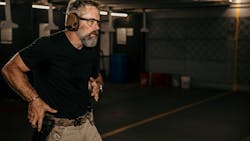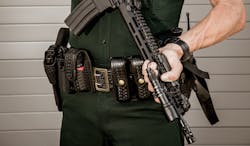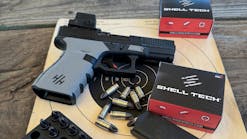By Duane Buckner, US Director of Training for Aimpoint Inc.
When was the last time you paid attention to what was on your duty belt? Don’t let this come as a shock…but you are carrying a lot of gear.
(Everyone wearing a badge just laughed or rolled their eyes, or both.)
The modern American LEO is awash in a sea of tools. Most of these are worn around their waist where they crowd each other for room. However, the most important “space” is the brain capacity associated with the use of each increasingly complex piece of tech. Each implement has its own set of limitations, instructions, maintenance, and suggested (or mandated) uses.
Officers are festooned with cameras, tasers, batons, computers, radios, lights, noxious sprays, phones, gloves, cuffs….and on and on. These taken by themselves present good answers to individual problems. The decline in their value begins when we have all these potential tools competing for our dwindling capacity to process under stress.
Our systems will already be significantly taxed with communication or determining our subject’s intentions or perhaps even trying to maintain awareness through a narrowing scope of perception. How many young officers have we seen race to their holsters and stop without drawing their weapon because they started issuing verbal commands? The act of forming a legible group of words can get in the way of something so common and important as the draw stroke. Under significant stress…we are not who we think we are, and the simplest things become complex.Hick’s law
This is a term that we have borrowed from the wider scientific community. The actual name is the “Hick-Hyman Law” and it refers to a much more inclusive behavior set in humans than the current context. The essence of what the law states is simple: Increasing the number of choices a person has available to them, also increases the time it takes to choose…logarithmically. Put in more recognizable terms: the more options you must think about, the longer it takes us to make a decision. It also means the quality of that decision is less likely to be optimum.
The reason that our decision-making quality is compromised, is that we do not have a sliding scale of capacity. We reduce the amount of time spent considering each option as we move through the list. We also associate other thoughts with each option as we pass through, robbing critical space from our fairly fixed processing speed (roughly 60 bits per second).
So you see, the more we have to think about…the less good we will be, in terms of decision making.
Once we install this in a law enforcement context, it quickly becomes something that we should all be paying a lot more attention to. The highly complicated inputs that flood an officer during a use of force scenario, coupled with the increasing demands of the associated tools and periphery are staggering. All the helping may be hurting.
Simplicity Wins, Complexity Kills
This isn’t just a pithy saying. It is an excellent description of how our brain works under significant stress. As much as we would like to believe it, we do not become more technically proficient when we are faced with something that intends to destroy us. There is good reason for this. Our system has a deep understanding of its capabilities and limitations.
When we face these threats (particularly the unexpected variety) our bodies shift into a much different gear. Many among us believe that new gear to be more focused. In a sense it is, but not in the way we are thinking. Consider what happens when you really concentrate on something. A good example would be working on something very small, with your hands or possibly precision tools. Would you say that your situational awareness goes up…or is it significantly reduced by the job in front of you?Most of us would concede that situational awareness suffers when our brain is highly focused. Our systems are not designed for that kind of saturation. They are designed to reduce the threat to a single decision point. This is where the famous “fight or flight” terminology comes from. Those two options encompass a great deal of decision making. This…is simple survival.
In the moment, we are not benefitted by a large number of options. They slow us down. They make us less efficient at arriving at an appropriate decision. Our bodies marshal assets away from fine thinking and toward simplicity. We are far more suited to run from a lion than we are to engage in reasoned debate, under the effects of stress.
We become simple, very simple.
Tools or Impediments
Having tools is a good thing. They typically expand our capabilities significantly. It would be very difficult for us to drive a nail without a hammer or bore a hole without a drill. In law enforcement, choosing a tool is much more varied and far from simple. Many more considerations must be taken. Your lives and the lives of others depend on it.
The preliminary question is this: What makes something a tool? Primarily, as is written above, whatever is in question must expand our capability. It must serve in the gap between where our ability stops and where the desired state starts. A good tool will seamlessly bridge this narrow, without taxing the user too much with its application.
The opposite of a tool in an impediment. This is something that widens the gap to the desired state. An impediment removes capacity from the user. It is a tax on the system. Unfortunately, these are not rare. Most of us carry them on a daily basis. They are subtle and hide behind the normal that we experience most of the time.
A roofer will tell you that a too heavy hammer won’t show itself until the middle of a summer day on a steeply pitched roof. On the level floor of an air-conditioned hardware store…it seems perfect.
We choose tools based on “best case scenario thinking”
The brain that we walk around with daily, slightly resembles the brain we have when things go significantly bad. Unfortunately, this mentality is the state that we typically use to choose the lifesaving equipment we employ. We are far more likely to consider the nuances that a pistol’s grip provides, than the needlessly complex controls it features. Grip is certainly important but imagine yourself struggling with confusing or complicated levers or buttons, while “falling out of the airplane” (trying to fix the pistol under stress).Consider something as simple as placement on your belt. You can easily convert a good tool into an impediment by putting it in the way of something vital. We have all seen a litany of gear draped over, or in front of a duty weapon. Whatever that thing is may be useful elsewhere, but when that pistol is needed…it is the most dangerous impediment you can carry. When the hand meets it, instead of the expected pistol, the unfortunate user has slowed their process, dramatically (see Hick’s Law above) by introducing more decisions and processing to the problem.
The Answer?
Simplify, simplify, simplify. Consider your tools for their durability and ease of use. Carry only what you must and think long and hard about how you carry it, how you employ it. Don’t plan with your everyday brain. Imagine walking through thick mud (cognitively) with trembling hands and perceptive narrowing. Tools are only tools if they help…if they don’t, they are far worse than just extra weight.
Be safe.





